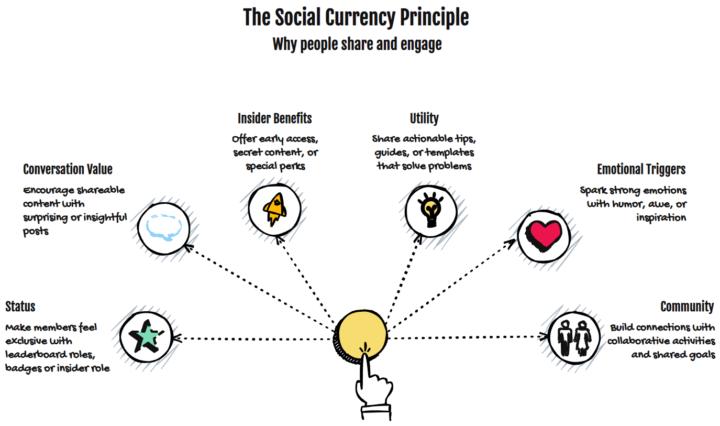Activity
Mon
Wed
Fri
Sun
Apr
May
Jun
Jul
Aug
Sep
Oct
Nov
Dec
Jan
Feb
What is this?
Less
More
Owned by Rustin
Most emails erode trust and revenue. This $100M framework, battle-tested with global brands, makes your team sharp, fast, and impossible to ignore. 🔥
Build Chrome extensions faster. Fix MV3, API, and automation issues other devs can’t... including undocumented problems/freezes Google won’t explain.
Memberships
6 contributions to The Offer Lab
The social currency principle: why people share (and how Skool grows because of it)
People don’t just share stuff for the sake of it. They share things because it says something about them. Sharing makes them feel good, look good, or connect with others. That’s social currency, and it’s what drives engagement, community, and word-of-mouth. For the back story, Jonah Berger, a marketing professor (and the author of Contagious: Why Things Catch On) came up with the term while researching into why certain ideas, products, and behaviors go viral. He wanted to understand why some things spread through word-of-mouth marketing while others don’t. (a cool story to read on that) The principles are easy. People share and engage because of: 1. Status & Identity – Makes them appear knowledgeable, VIP, or part of a select group. Example: Exclusive clubs or invite-only platforms 2. Conversation Value – Content that is surprising, entertaining, or insightful makes them seem interesting. Example: The Ice Bucket Challenge 3. Insider Benefits – They love feeling like they have access to something rare, early, or secret. Example: pre-launch access, or hidden menu items 4. Utility & Practicality – Useful information makes them appear resourceful. Example: Life hacks, financial tips, or productivity tricks 5. Emotional Triggers – Content that evokes strong emotions (positive or negative). Example: Inspirational, shocking, or heartwarming moments 6. Affiliation & Community – Content that aligns with their identity or group to reinforce belonging. Example: Political opinions, sports teams, or lifestyle choices. Now, how would that work for a Skool community, you'd ask :) 1. While there is no way (yet) to really distinguish members except with leaderboards, you can create exclusive pfp template reflecting your community’s colors, or a pinned post to celebrate their contributions. It’s like handing them a digital trophy for being awesome! 2. Post content that’s surprising, insightful, or fun (yes, it doesn't always have to be serious ^^). Think viral memes, mic-drop lessons, or shocking stats

Why problem-solving frameworks are the key to offer clarity
If your offer isn’t landing, it’s usually not the value, but the messaging. The way you position your offer might feel obvious to you, but to your audience? It’s often unclear. That’s where problem-solving frameworks come in. They force you to think like your audience: - What’s their biggest pain point? - What happens if they ignore it? - How does your offer solve it in a way they’ll understand? These frameworks simplify the complex. Instead of overwhelming your audience with features or vague promises, they guide you step-by-step: - Start with the problem. - Show them the consequences. - Offer a clear, actionable solution. When you use a framework, your offer stops being a confusing pitch and starts feeling like the obvious answer. It’s not about what you think they need. It’s about showing them that you get it. You don’t even need to reinvent the wheel. PASTOR, SCAMPER, 6 Thinking hats... frameworks give you structure. And structure = clarity. Which frameworks have helped you refine your messaging? Let’s hear it below. 🚀

2 likes • Jan '25
"your offer might feel obvious to you" - so true @Sylvain Zyssman How is it that when I help other people with copywriting it seems to be so much easier. Yet, when I do copywriting or offers for my own stuff I get painfully stuck??? For example, I just did a successful digital radio campaign for a landlord looking to fill his rentals. The copy came easy. Yet, I'm STUGGLING to finish up my own stuff. 🧐

All the information in the world won’t make you wise
"𝐼𝑛𝑓𝑜𝑟𝑚𝑎𝑡𝑖𝑜𝑛 𝑖𝑠 𝑛𝑜𝑡 𝑘𝑛𝑜𝑤𝑙𝑒𝑑𝑔𝑒. 𝑇ℎ𝑒 𝑜𝑛𝑙𝑦 𝑠𝑜𝑢𝑟𝑐𝑒 𝑜𝑓 𝑘𝑛𝑜𝑤𝑙𝑒𝑑𝑔𝑒 𝑖𝑠 𝑒𝑥𝑝𝑒𝑟𝑖𝑒𝑛𝑐𝑒. 𝑌𝑜𝑢 𝑛𝑒𝑒𝑑 𝑒𝑥𝑝𝑒𝑟𝑖𝑒𝑛𝑐𝑒 𝑡𝑜 𝑔𝑎𝑖𝑛 𝑤𝑖𝑠𝑑𝑜𝑚." - Albert Einstein We’re drowning in information but we desperately need clarity. You can watch endless tutorials, read every book, and save 100 “must-see” posts, but unless you apply what you’ve learned, it’s just noise. And here’s why Einstein’s quote hits so hard: consuming content alone doesn’t create wisdom. We can't just gather facts. We need to turn knowledge into actionable insights. We need to test, fail, reflect, and adjust. Experience becomes our guide, not just the ideas we've read about. We need to bridge gaps in understanding and create practical solutions where others see unrelated pieces of information. That's why education that focuses on action is powerful. It transforms learning from something passive to something real. Experience shows you what works, what doesn’t, and what to improve next. Without experience, you'll end up repeating someone else’s ideas without making them your own. Every step you take, every mistake you make, is part of your personal journey. They become lessons you can teach, share, and build upon. The mission isn’t just to consume more, but to contribute more. To turn from a learner into a leader. Synthesizers' approach helps you focus, so you can build real wisdom from action. Or, as Goethe said: '𝐾𝑛𝑜𝑤𝑖𝑛𝑔 𝑖𝑠 𝑛𝑜𝑡 𝑒𝑛𝑜𝑢𝑔ℎ; 𝑤𝑒 𝑚𝑢𝑠𝑡 𝑎𝑝𝑝𝑙𝑦. 𝑊𝑖𝑙𝑙𝑖𝑛𝑔 𝑖𝑠 𝑛𝑜𝑡 𝑒𝑛𝑜𝑢𝑔ℎ; 𝑤𝑒 𝑚𝑢𝑠𝑡 𝑑𝑜.'"

Close your calls like Alex
Andre Kirby and Alex Hormozi always say that you need to practice your sales calls a lot, know your offer perfectly, and know how to handle objections. Doing that IRL is kinda hard (gotta book calls to start with ^^) and you don't always get objective, actionable feedback on how you did. So I made that for you all to use for free -as long as you have a paid chatgpt plan, if not you'll be limited to +/- 5 questions- : CLOSEitLikeAlex makes Hormozi's brain and experience accessible whenever you want for you to practice your calls. I made a "pretty long" (12 min ^^) video going from the start to the end of the call, using Andrew's famous Synthesizer call flow. But TL;DR: - 3 levels of client difficulty, directly impacting his mood and objections - 2 options for feedback (after each iteration / at the end of the call) - Real-time client mood and feeling - End of call feedback with skills, areas to improve and overall score You can go really far into the questions and objections you face, and the bot will directly react to what you say or ask. Trust me, the gap between each level is REAL! I hope it'll help you improve, it already helped me quite a lot, if you have any feedback or improvement idea please tell me. PS: the bot is here to help you figure out where you can improve. It's not a guarantee you'll close your call. For more guidance, follow the best closer's advice around here on Skool!

1-6 of 6
@rustin-s-1546
Founder of Email Magic | Host of Training That Works 🎙️
Closed $100M+ in tech sales. Now helping teams write emails that drive revenue and trust.
Active 26d ago
Joined Jan 6, 2025
Wisconsin, United States
Powered by


